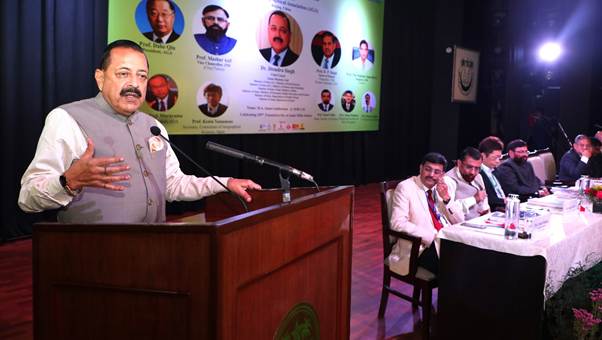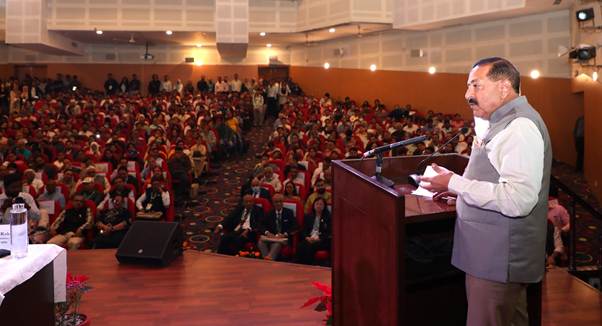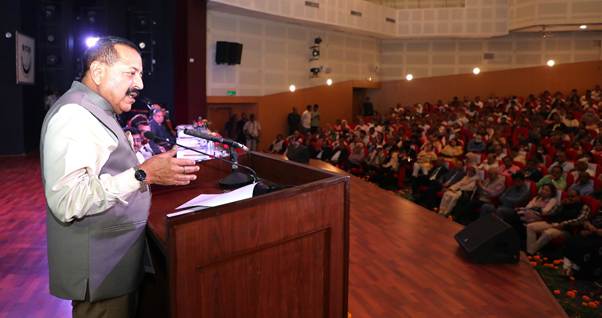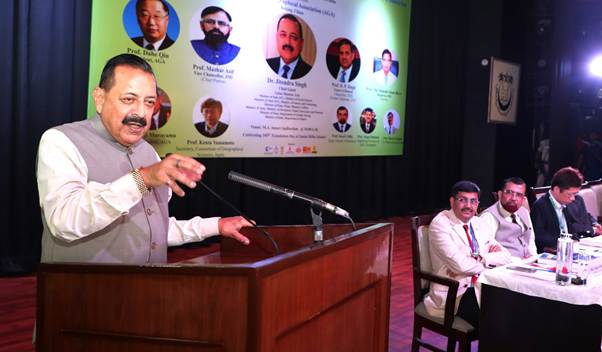Ministry of Earth Sciences
India calls for people-led climate action; stresses policy–technology–youth synergy for sustainable urban futures: Dr. Jitendra Singh
Calls for collective effort by Asian nations to ensure a resilient and low-carbon future
India emerges as a global torchbearer linking economic growth with environmental sustainability: Dr. Jitendra Singh
Dr. Jitendra Singh highlights India’s Green Hydrogen, Circular Economy, and LiFE initiatives as models of sustainable development
Empowering youth with knowledge and digital tools is key to a sustainable future, says Dr. Jitendra Singh at Jamia Millia Islamia
Posted On:
06 NOV 2025 6:58PM by PIB Delhi
Delivering the inaugural address at the Asian Conference on Geography (ACG 2025) at Jamia Millia Islamia, New Delhi, Union Minister of Science & Technology Dr. Jitendra Singh said that the conference is timely and crucial, as it addresses three deeply interconnected issues- climate change, urbanization, and sustainable resource management, that collectively determine the sustainability of our shared future.
Dr. Jitendra Singh, today said that India has emerged as a global torchbearer in linking economic progress with environmental sustainability, guided by the vision of Prime Minister Narendra Modi to achieve a net-zero target by 2070 and encourage a lifestyle in harmony with nature through the LiFE- Lifestyle for Environment movement.
The Minister lauded Jamia Millia Islamia for hosting the first-ever edition of this prestigious conference in India and commended Vice-Chancellor Prof. Mazhar Ali and the organizing team for bringing together international experts, academics, and students to deliberate on these global challenges.
Dr. Jitendra Singh observed that Asia lies at the centre of global transformation, marked by impressive industrial and economic dynamism, yet contributing to more than half of the world’s greenhouse gas emissions. Citing the IPCC Sixth Assessment Report, he cautioned that the region faces growing vulnerability to extreme weather events, including heatwaves, floods, and water stress, if emissions continue at current levels.
He highlighted that South Asia alone is home to over 750 million people exposed to severe climate hazards, from Himalayan glacier melt to coastal flooding and urban heat islands, emphasizing that Delhi, Dhaka, Bangkok, and Manila are among the most climate-vulnerable megacities projected by 2050.
Dr. Singh pointed out that urbanization, while a symbol of progress, has also emerged as a major challenge due to unplanned expansion, encroachment on floodplains, depletion of groundwater reserves, and rising pollution levels.
Referring to the 2014 Srinagar floods as an example, he said that such disasters are not merely natural, but often aggravated by human negligence and poor planning. He cited alarming statistics: nearly 80% of wastewater in developing Asian countries is discharged untreated, and urban India generates over 55 million tonnes of solid waste annually, growing at 5% per year.
Dr. Jitendra Singh stressed that waste-to-wealth technologies and circular economy initiatives are key to the future, where the very concept of “waste” will disappear. Sharing examples from Dehradun, he mentioned successful initiatives such as used cooking oil recycling, which not only supports environmental goals but also generates income at the community level.
He underlined that no government initiative can succeed without public participation, saying that “unless there is a social movement, no amount of policy or seminar will yield optimal results.” He credited the success of the Swachh Bharat Mission to the mass behavioural shift it inspired among citizens. Dr. Singh said that India’s commitment to sustainable development is enshrined in a robust framework of policy and governance.
The Minister cited the National Action Plan on Climate Change (NAPCC), State Action Plans, Smart Cities Mission, AMRUT, and Swachh Bharat Mission as key examples of how sustainability is being embedded into urban planning and governance. He noted that the LiFE initiative introduced by Prime Minister Modi has inspired a global movement towards responsible consumption, sustainable living, and environmental stewardship.
“India’s initiatives, from Green Hydrogen to Bio-Economy, Circular Economy, and Digital India, reflect our determination to harmonize economic growth with ecological balance,” he said. Highlighting the role of science and innovation, Dr. Singh said that scientific research and technology are at the heart of India’s sustainability agenda.
He mentioned the contributions of ISRO’s Earth Observation Missions, the National Geospatial Policy (2022), and the Survey of India’s drone-based mapping under the SVAMITVA programme, which have transformed planning and monitoring for climate resilience.
He also highlighted the crucial role of education, youth, and universities in shaping a sustainable future. Referring to the National Education Policy (NEP) 2020, he said that the new academic framework enables students to explore their true aptitudes and engage with interdisciplinary subjects like geography, which are vital for environmental understanding. “Empowering youngsters with the knowledge and tools for sustainability,” Dr. Singh said, “is the most powerful investment in our collective future.”
Noting that over 70% of India’s population is below 40, Dr. Singh urged that the language of climate action must be the language of youth; digital, creative, and inspiring. He suggested leveraging social media campaigns and short digital content to spread awareness on sustainable practices, adding humorously that even small actions like collecting used oil instead of discarding it can create economic and ecological value when done at scale.
Calling for stronger regional and international partnerships, Dr. Singh said that India has been at the forefront of global cooperation through initiatives such as the International Solar Alliance (ISA) and the Coalition for Disaster Resilient Infrastructure (CDRI). He reiterated that Asia, being both the most dynamic and most vulnerable region, must collaborate closely to ensure a resilient, low-carbon, and equitable future.
Expressing gratitude to Jamia Millia Islamia for organizing the conference, Dr. Jitendra Singh said that such platforms strengthen academic collaboration, policy dialogue, and youth engagement on pressing environmental challenges. He concluded by saying that “Climate is not just the concern of policymakers or scientists; it is a personal concern for every citizen, for our own health, our own well-being, and our children’s future.”




*****
NKR/AK
(Release ID: 2187081)
Visitor Counter : 1097